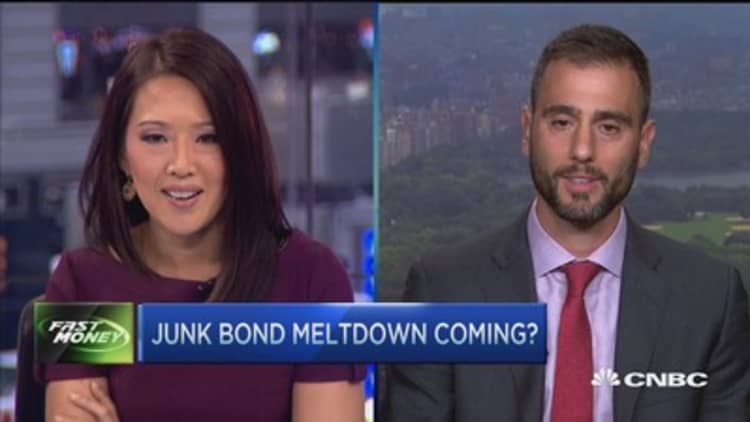
Investors are missing a serious threat ahead in the bond market, according to one analyst who sees the ranks of the "fallen angels" swelling.
The term refers to companies formerly with investment-grade ratings that for one reason or another — often unsustainable debt loads — get downgraded to junk.
Michael Contopoulos, high-yield strategist at Bank of America Merrill Lynch, warned clients to watch out for a "migration cycle" of downgrades could affect $300 billion or more worth of junk debt. That number presumably would shoot even higher if the next cycle is even more serious than historical norms would indicate.
Should his scenario play out, that would grow the entire high-yield space by 25 percent, in the process lowering aggregate credit quality, increasing default risk and causing a glut of junk paper that would cut into the market's value and hit investment returns.
"The overall indigestion to the market could prove massive," Contopoulos wrote. "We hear so much about the potential for outflows, but very little about the potential for new paper through downgrades. The latter dwarfs the former."
The warning comes amid a recent swing of investor money back into fixed-income funds after running in the other direction for much of the year. Inflows to fixed income have amounted to nearly $6 billion over the past two weeks.
Read MoreDon't look now, but bonds are back (junk, too)
Contopoulos, though, has warned that the junk market is a "slow-moving train wreck," and he said the recent inflows to high yield have come primarily from exchange-traded funds, which tend to be more short-term focused than mutual funds.
Signs of stress in the $8.1 trillion corporate debt market are popping up in various places.
Moody's liquidity stress index, for example, is near a five-year high thanks to risk in the energy sector. Of 12 corporate defaults in the third quarter, five were from energy companies. The rating firm's covenant quality index, which measures restrictions placed on issuers, is also near record highs, indicating a low level of safety requirements from bond buyers.
Investors tempted to wade back into the high-yield waters due to the lure of lower prices should beware, Contopoulos said. That goes as well for investors encouraged that market expectations have put the first Federal Reserve rate hike well into 2016.
"We've said for a while now that the benefits of low rates have long been sapped from the market, and are in no rush to change our tune on the back of a two-week rally," he said. "In fact, we would argue that we have witnessed nothing but a dead-cat-bounce in HY, and a price action which has little if anything to do with the expectation for rates or improved fundamentals, and everything to do with ETF buying and short covering."
Read More The US is closer to deflation than you think
"As hard as it is to accept that this glorious run for credit has come to an end, in our view it is time to acknowledge that valuations do not justify the risk-reward profile in HY, and no amount of (quantitative easing) or easy monetary policy is likely to change the story for an extended period of time," Contopoulos added.
"The market is in its seventh or eighth inning and without a substantial increase in earnings — a prospect that will require fiscal policy changes more than monetary stimulus, in our opinion — we think high yield will have a difficult time sustaining rallies."






